Going for green: How we can adapt our travel habits in Portsmouth
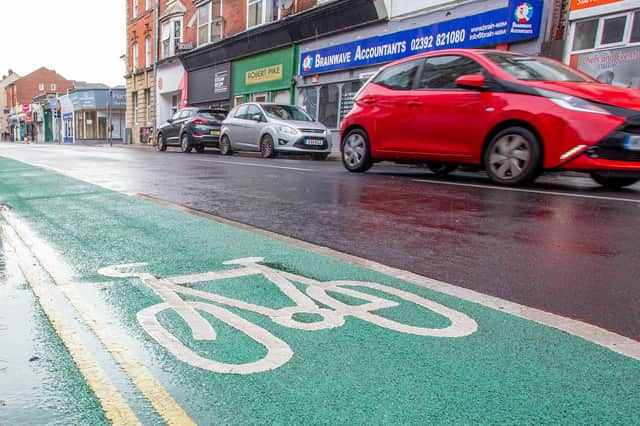

Pre-Covid, a car was something many of us would use every day, whether getting to work, school, college or to see friends and family. And unless you live within close proximity it is very easy to jump in a car rather than considering the alternatives.
So it is unsurprising that transport is now the largest source of carbon emissions in the UK - accounting for a total of 28 per cent, according to the Department for Transport (DfT).
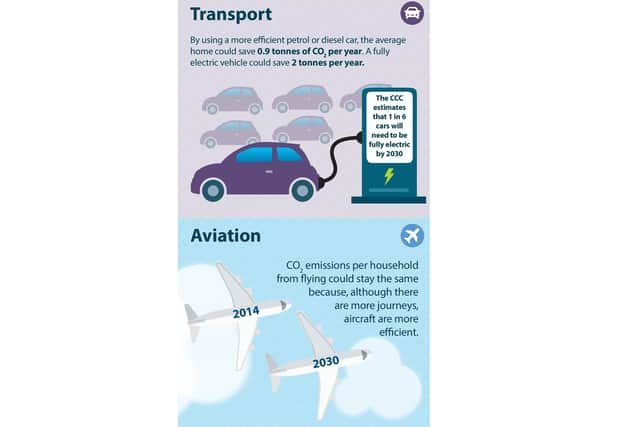

Advertisement
Hide AdAdvertisement
Hide AdAnd despite improvements made to fuel efficiency and the rise in electric vehicles, UK transport emissions are basically unchanged since 1990 - with just a three per cent decrease.
One reason for this is car and van numbers rise every year and have done for the last 50 years.
In 1970 there were 15 million vehicles registered in the UK, that figure is now 40 million - or a 160 per cent rise but the UK population has only risen by 20 per cent in the same period.
Within this growth in car ownership significantly more people are buying heavier, more polluting vehicles (SUVs) instead of ‘normal’ sized cars - with SUV sales making up six per cent of sales in 1990 to 25 per cent now.It is also true that aviation emissions have doubled since 1990, making flights the second largest source of UK transport emissions now.
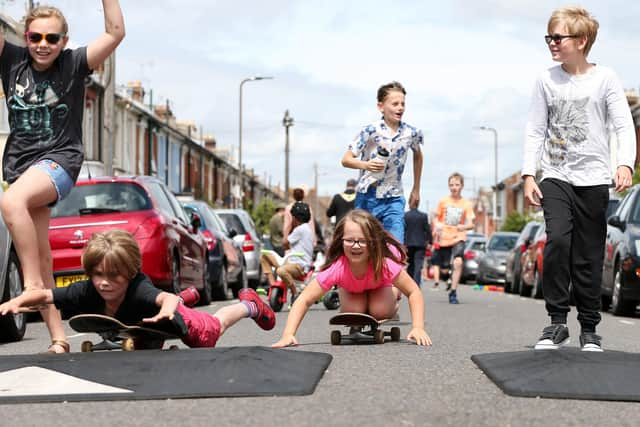

Advertisement
Hide AdAdvertisement
Hide AdBut while the rise in transport emission in the UK must be considered - how does this compare in Portsmouth?
Statistics from the council show road transport makes up 37 per cent of the city’s carbon emissions - a figure that has not changed in a decade.
And although Portsmouth is relatively small and flat, 60 per cent of car journeys made in the city are for trips under two miles.
So as part of the Portsmouth Climate Action Board’s drive to tackle the climate emergency, transport is one of the key areas for change.
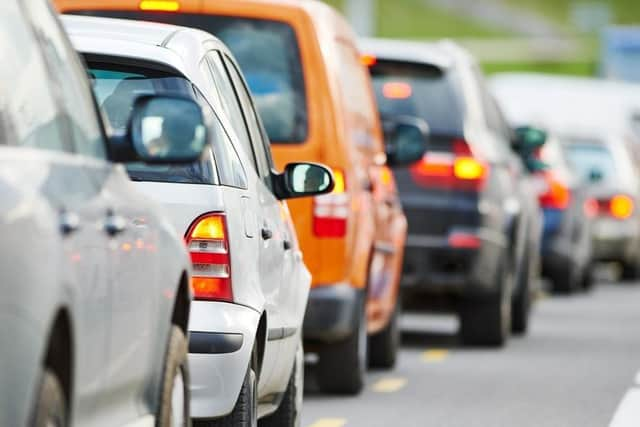

Advertisement
Hide AdAdvertisement
Hide AdBoard member Nick Sebley said: ‘It is shocking that in 2021, emissions from transport are basically at the same level as in 1990.
‘The government details the main causes itself: the number of vehicles on the road rises every year, and the market share of SUVs has risen from six per cent to 25 per cent.
‘Locally we have seen the impact of these trends: more stress over parking, toxic air quality, and growing congestion at rush hour. The evidence is clear: we need to make it safe to cycle, pleasant to walk, cheap to catch a bus, and discourage driving for non-essential journeys: then we will see emissions fall.’
Car emissions don’t just affect the climate crisis, they can lead to health problems - with poor air quality reported to cause 95 deaths in Portsmouth every year.
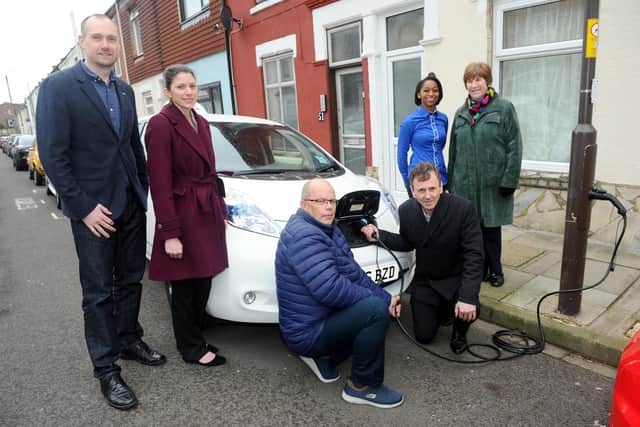

Advertisement
Hide AdAdvertisement
Hide AdIan McCulloch, a Green Party activist from Portsmouth, said: ‘Poor air quality is shortening people’s lives in Portsmouth and there’s data to support that.
‘The data also shows us that broken down by wards, it is the poorer areas that are always the worst affected.
‘It’s great to reduce emissions from cars and see more electric vehicles used but I think people are starting to realise that there are just too many cars on the road - which is made clear when people can never find anywhere to park.
‘We need to encourage active transport as much as possible - whether walking, cycling or something else and this will also help with the obesity problem we have. The issue at the moment is people don’t feel completely safe cycling in the city.’
Advertisement
Hide AdAdvertisement
Hide AdBut with the number of vehicles registered in the city rising from 90,000 in 2009 to 103,000 in 2018 there are no signs that people are willing to give up their cars.
Not only this but Portsmouth suffers from congestion at peak times, with vehicles travelling on average 32 per cent more slowly than the national average.
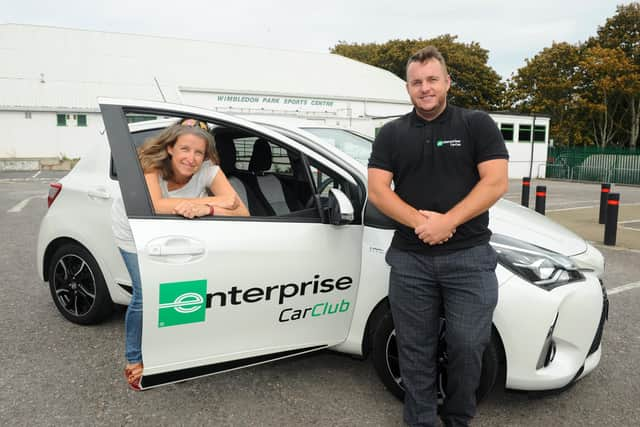

And Portsmouth City Council held data showed (pre-Covid) 40,000 people commute in, and 30,000 commute out of Portsmouth every day.
Some schemes to cut car use and provide alternatives have been trialled or at least considered by Portsmouth City Council.
Advertisement
Hide AdAdvertisement
Hide AdThese include the installation of electric vehicle charging points in residential streets and an electric scooter rental scheme, which launches today.
By the end of this year the south west of the city will also be subject to a clean air zone that has been imposed by government and will charge buses, coaches, lorries and taxis of a certain age between £10 and £50 a day to enter.
And with the government’s announcement of a £3bn plan to make buses easier and cheaper to use nationwide - this could be something that makes a difference to our travel habits in the city.
It’s very easy to say we will reduce our car use but what are the alternatives and how feasible are they for our day-to-day lives?
Advertisement
Hide AdAdvertisement
Hide AdMany have campaigned for greater use of bikes around the city, with the Pompey Cycle Forum at the forefront of such discussions.
However, 75 per cent of local cycle routes fall below Department for Transport criteria and the Pompey Cycle Forum have previously argued that one of the key issue is a lack of fully-segregated, continuous cycle routes.
Forum member, Jon Riding, said: ‘Cycling has the potential to solve many of the problems suffered by our city at the moment. Pollution, traffic congestion and obesity can all be tackled by getting more people on bikes.
‘Portsmouth is unusually well suited to cycling. It is a flat, compact and temperate city where virtually any journey can be made by bike in just a few minutes. However, many people in ‘Portsmouth are reluctant to make the choice to cycle due to concerns about the safety, security and convenience of cycling.
Advertisement
Hide AdAdvertisement
Hide Ad‘What is needed is a network of safe, direct cycle routes around the whole city which take people to where they want to go with secure cycle storage at the destination. Build that and you will be amazed at what will happen. You only have to look at London to see what it can do.’
For some lockdown has shown that they might not need their car at all times - but for those who don’t want to be without one for good there is the option of joining a car club.
So far two car clubs have been set up in Portsmouth, in Fratton and Southsea, by rental company Enterprise.
Rental cars are kept in set locations - in Rodney Road and the Wimbledon Park Sports Centre, in Taswell Road - for members to collect after booking a slot.
Advertisement
Hide AdAdvertisement
Hide AdThose who sign up to the system can book a time slot to use the car for as little as half an hour. Their phone, bank card or membership card then unlocks the car from outside with the keys accessible from inside the car.
The cars are disinfected between slots and members can use any Enterprise cars at locations across the country.
Currently the cars provided by Enterprise are hybrid models, however, there is scope for electric cars to be used in the future.The Wimbledon Park Patch community group lobbied for one in their area as a way to reduce car ownership and relieve parking pressures.
Group co-ordinator Clare Seek said: ‘There’s definitely a benefit to using the car club.
Advertisement
Hide AdAdvertisement
Hide Ad‘Some people have used it as a way to get rid of their second car, especially since lots of people are now working from home. But for others it means they don’t need to run their own car at all anymore. If you’re only using your car once a week or once a fortnight the car club works really well.
‘It encourages you to walk or cycle for short journeys which helps the environment but it also saves you money because you only pay when you use the car. You no longer need to worry about insurance, tax and car maintenance which are all costly.’
City residents can currently join the club for £10 a year by using the code Portsmouth10 via the Enterprise website, which provides £10 of credit to drive.But however we decide to change our own transport habits - given that the amount of traffic is predicted to increase by roughly 20 per cent in the next decade - it is clear change in whatever form is needed.
PANEL
What would travel in a Net Zero Portsmouth look like according to the Portsmouth Climate Action Board:In a net zero Portsmouth it would be safe, easy, and enjoyable to travel across the city by bicycle or on footThe 40,000 people who commute into Portsmouth from Havant and Fareham every day, would have access to excellent commuter cycle routes that would enable them to get to Portsea within 30 minutes; and showers and changing rooms at work to freshen up once they arrive. There would also be storage hangers to keep their bikes safe.Public transport would be cheap, efficient and integrated
Advertisement
Hide AdAdvertisement
Hide AdThose that choose to travel by train would find season tickets cheaper than driving in, and much better bike storage both on the train and at the train stations, enabling them to get to work cheaply and quickly. Bike hire would also be available at stations, and could be included as an option in a rail season ticket price. Buses would have priority routes, tickets bought via an app, and could be used, like an Oyster card, on buses, regional and inter-city trains, and trams.
Non-essential car journeys would be discouragedThe number of parking spaces would be reduced and these prioritised for people who can’t travel or work without vehicles (for example those with mobility needs and tradespeople). Hiring electric cars or vans when needed would replace ownership for many people, and would be as simple as booking an Uber taxi.Other benefits: cleaner air, less time stuck in traffic, healthier kids and residentsAll of these measures have huge side benefits such as improving the quality of the air we breathe, reducing road congestion so bus travel and essential car journeys would be quicker, and making our kids healthier and fitter. If walking and cycling became the norm for short journeys then conditions that are fairly common in Portsmouth now, such as asthma, heart disease and COPD would likely become much rarer.
How we can get there
Modifying our streets so that active travel becomes a quick, safe and attractive option for short journeys
Locally this could mean creating a network of cycle paths that allow people to travel safely and quickly across Portsmouth and its surrounding regions. It would also mean creating clearly marked walking routes that were attractive and enabled residents to get easily to places like Gunwharf Quays, Southsea and other centres.Creating an excellent public transport system
Advertisement
Hide AdAdvertisement
Hide AdThis would allow residents to use one ticket to travel seamlessly and cheaply on train, tram and bus across an entire region.Locally this would need central government legislation, because currently the local authority has no powers to control bus / train routes, timetables or prices.
Disincentivising car use
Studies have shown that even if you make public transport free, many people will still prefer to use their cars. The two measures above work most effectively when combined with other initiatives that disincentivise car use: for example removing parking spaces, increasing parking charges, workplace parking levy, introducing low traffic neighbourhoods or a mobility credit scheme.
Replacing petrol and diesel with electric vehiclesElectric vehicles are becoming cheaper, with a longer range. Local and central government can help the uptake of EVs by funding vehicle scrappage schemes, putting in rapid charging points and giving parking exemption, for example.
Other measuresIn addition to this behaviour change schemes- such as getting children cycling at school-, on demand transport innovations such as car clubs, and consolidated last mile delivery can also play an important part in helping us reduce transport emissions.
PANEL
Other ways you can make a change
Advertisement
Hide AdAdvertisement
Hide AdIT MIGHT seem like the only way to change your transport habits to be more environmentally friendly simply mean giving up the car in favour of walking, cycling or public transport.
But there are other things we can do as well.
Many people during lockdown have been rethinking whether they need a second car: one option is to give it up and join a car club instead. This means you can use a car as and when you need, without worrying about parking, MOTs, insurance etc. Each car club vehicle takes an average of six private cars off the road: which reduces air pollution and congestion. Enterprise Car Club are currently offering a discount: people who use the code PORTSMOUTH10 can get the first year's membership for £10 rather than £60, plus £10 credit.Organise a play street session
There was a time when residential streets were the focal point of community, and kids would play outside together regularly. The aim of the organisation Playing Out is to achieve this again, starting with closing streets to through traffic (not residents) one afternoon a month (or more) so that kids and neighbours can socialise in safety. Locally there is already a Playing Out session - also known as play streets. Email [email protected] from Portsmouth Playing Out to find out more.
Pompey Living Streets is a group of residents who would like to establish low traffic neighbourhoods across the city and help make our streets the focal point of community again. In particular, they want to make Portsmouth streets safe and enjoyable places to socialize, walk, cycle, play out and organise food sharing / gardening / exchanges.
Advertisement
Hide AdAdvertisement
Hide AdSet up a Low Traffic NeighbourhoodOne way to get people out of cars and walking and cycling more is through introducing low traffic neighbourhoods (LTN). The key principle of an LTN is that an area of residential streets becomes a sanctuary from ‘through traffic’.
If you would like to help establish LTNs in Portsmouth contact Pompey Living Streets on [email protected].
Sign up your child for a cycling proficiency course. Portsmouth City Council offers free Bikeability training up to level 2 for every Year 6 child, if they attend Portsmouth schools that encourage cycling as a means of transport to and from school.
If you are a major employer, consider implementing travel plans to reduce the number of your staff that travel to work by car alone. These help to cut congestion, relieve parking pressure, aid staff retention and save money on maintaining parking spaces.
Advertisement
Hide AdAdvertisement
Hide AdGet the train instead of the planeSome of us are understandably itching to jet off somewhere warm and unwind after a very difficult year. However flying is a particularly destructive activity when it comes to carbon emissions: a flight to Paris for example has 32 times the climate impact of travelling the same distance by Eurostar. The good news is that research shows when we give up flying it can inspire others to stop too. Check out the website flightfree.co.uk/ for more details, and the seat61 website to book train travel from the UK to anywhere in the world.
Comment Guidelines
National World encourages reader discussion on our stories. User feedback, insights and back-and-forth exchanges add a rich layer of context to reporting. Please review our Community Guidelines before commenting.